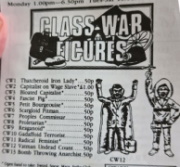|
What was that about. Was it the only war in history fought for altruistic honorable reasons of making the world safe for democracy and self-determination for all nations, because despite his personal flaws of being a huge racist and possibly dishonest when he promised to stay out of the war to get elected, Woodrow Wilson was pure in his professed humanitarian aims behind killing loads and loads of people? Or was it, like all other wars, about more tangible things like money, territory, colonies, and control of international trade. D&D debates and discusses despite this low effort OP! VitalSigns fucked around with this message at 21:40 on Aug 17, 2022 |
|
|
|

|
| # ? May 2, 2024 18:21 |
|
Wilson was a contradictory mess of a person, on the one hand a man who did I think sincerely believe in non-intervention* in the affairs** of other nations***, but also a raging white supremacist and anti-communist (though not to level of Churchill, not that that's saying much) and prior to 1916 does show most signs of wanting to keep America out of the war. Here, I argue that his upbringing in the defeated South played a role as he had first-hand knowledge of how long it took a society to get back on its feet following a long knock-down drag-out rear end kicking. I think he was being honest with his campaign promises to keep America out of the war, but saw the German resumption of unrestricted submarine warfare plus the laughably inept German approach to Mexico as the sort of provocation that couldn't be ignored. His views on Imperial Germany and the Central Powers similarly contains more than its share of contradictions. In abstract terms, he saw all of them as non-democratic/insufficiently-democratic states who's aggression threatened world peace (ignoring as always the complicated mess that was the July Crisis of 1914 in which it gets real hard to assign blame solely to one party or another), but in pragmatic terms he was at least as concerned with the danger to Anglo-American hegemony and global interests that would result from a victory for the Kaiserreich, and as we talked about in the other thread when Wilson was talking about spreading democracy worldwide, he meant it in a paternalistic "civilizing mission" kind of way. So yeah OP, I'd say like most questions of this sort it's kinda both, with material concerns dovetailing with idealistic proclamations, and though Wilson was a staggering hypocrite in his lofty statements I do think he at least believed himself sincere in making them. Yes I just taught a seminar on WWI last semester why do you ask? *As pertains to affairs in the other major world powers, Ottoman Turkey excepted for obvious reasons. **So long as they're not, say, doing things United Fruit would rather they didn't. ***Unless they're not white, of course.
|
|
|
|
to start, the failures of 1848 made WW1 inevitable. industrialization had taken the European aristocracy from a commanding position on top of the socioeconomic order to actually having to fight to preserve it for the first time in a century, and were slowly losing more and more of their power to new money. one of the only ways to keep the rising tide of constitutionalists, socialists, etc at bay was to demonstrate how hot poo poo the aristocracy was at fighting wars, and so at a point where most of the great powers of europe were facing down a bunch of domestic tumult, all of their leaders were happy (and indeed eager) to launch a nice quick war to bolster their popularity. punchline goes as you know. on an idealistic level, Wilson jumps in towards the tail end because he sees a way to reconcile the three fundamental forces that have caused this war (aristocracy, democracy, and the need for someone to do all the unpleasant stuff) and he knows that if America doesn't do its share of the bleeding he will just be talking to himself about it while the triumphant powers parcel out territory. at Versailles he articulates a vision of a future where all white men are equal participants in a glorious democratic tradition, attended by the colonial servants they've allocated each other and tasked with keeping everyone's drinks topped up. every white man an aristocrat, everyone else gets a nice formalized ownership certificate and a list of assigned duties: the Confederate vision of heaven. on a slightly less idealistic level, it's still the era of America trying to find a way to earn international prestige, and what better way to earn some prestige than get a bunch of your boys killed in the big war we've got going on the material side of things has always puzzled me, though, because while there was money to be made from war, i'm not clear where and how those voices would have been loudest in the Wilson administration.
|
|
|
|
Well one of the material issues that's often brought up by the sort of unpatriotic defeatist wreckers who were imprisoned during the war to keep their seditious arguments from undermining morale on the home front is the huge amounts US banks had invested in British and French war bonds that would be lost if a German victory bankrupted the entente. Another is the money the arms industry made although I'm not sure how much of a difference American entry made to weapons manufacturer profits since it's not like they weren't making money by supplying belligerent powers before the US entry. Smedley Butler did point out there was still a business case for direct US involvement though quote:Take the shoe people. They like war. It brings business with abnormal profits. They made huge profits on sales abroad to our allies. Perhaps, like the munitions manufacturers and armament makers, they also sold to the enemy. For a dollar is a dollar whether it comes from Germany or from France. But they did well by Uncle Sam too. For instance, they sold Uncle Sam 35,000,000 pairs of hobnailed service shoes. There were 4,000,000 soldiers. Eight pairs, and more, to a soldier. My regiment during the war had only one pair to a soldier. Some of these shoes probably are still in existence. They were good shoes. But when the war was over Uncle Sam has a matter of 25,000,000 pairs left over. Bought -- and paid for. Profits recorded and pocketed. Although hard to know who had the power to directly lobby to enter the war versus only enough to lobby for some nice contracts once we were already in it. https://ratical.org/ratville/CAH/warisaracket.html VitalSigns fucked around with this message at 22:33 on Aug 17, 2022 |
|
|
|
I don’t understand the arguments in the other thread about why the US went to ww1. It was the Zimmerman telegram. I didn’t think this was in dispute.
|
|
|
|
Comstar posted:I don’t understand the arguments in the other thread about why the US went to ww1. the Zimmerman telegram is something we easily could have (and frequently over the course of our history, did!) ignored. it made a decent justification, but an America that did not want to kill a couple thousand of its young men ostensibly in service of the real, existent, and definitely-freedom-based common cause of Britain, France, and Imperial Russia? that country tells German diplomats "we know, and if you try that poo poo we will join the war on the other side. got it? good" and carries on happily loaning money and selling arms to all sides. for whatever reason, the American powers that be really wanted in on the tail end of getting slaughtered to preserve the sanctity of the Austrian imperial succession
|
|
|
|
Was that why or did that help provide a public justification for the war to overcome domestic opposition to what Wilson already wanted to do. You could as well say, oh we know why the US declared war on Spain in 1898, because of the USS Maine! But was that the reason, or was it an excuse for the government to do what it wanted to do anyway. If the US didn't want to go to war, the destruction of the Maine wouldn't have forced them right, they could have reacted to it differently. So in one sense we went to war because of the Maine (it finally provided a way to get the public on board with the war), but if you want to know why the US wanted to attack Spain in the first place well. VitalSigns fucked around with this message at 03:53 on Aug 18, 2022 |
|
|
|
Wilson came in to the war to bail out the British and french bankruptcies. The Zimmerman telegram is all cool and good but why didn't we do anything about Mexico if it was such a deep threat? And the Zimmerman telegram was intercepted by British intelligence and reported to us. We didn't intercept it. So funny enough Britain has a pretty good interest in telegraphing Washington with this recent development that their enemy planned to coax Mexico into making the US pay for it. The Lusitania was a huge part of this even thought it was literally running guns, but that happened years before the war.
|
|
|
|
Regarding the Zimmerman Affair, while previous posters are entirely right about the cynical way the government took advantage of the moment, you have to remember that the revolutions/civil wars in Mexico had been spilling over the border for a few years at that point and the public was more-than-usually primed to be pissed off about all things regarding our southern neighbor (to say nothing of the ambiguous mention of Japan in the telegram, to throw some Yellow Peril paranoia into the mix). The outrage which erupted following the publication of the telegram in major newspapers was as authentic as it was ugly, and not something that needed to be ginned up by opportunistic warmongers in the nascent MIC, though one assumes they were just as happy to see it as anyone.WAR CRIME GIGOLO posted:The Zimmerman telegram is all cool and good but why didn't we do anything about Mexico if it was such a deep threat? And the Zimmerman telegram was intercepted by British intelligence and reported to us. We didn't intercept it. So funny enough Britain has a pretty good interest in telegraphing Washington with this recent development that their enemy planned to coax Mexico into making the US pay for it. While the British did forward it, the State Department had intercepted it on their own. Captain_Maclaine fucked around with this message at 15:22 on Aug 20, 2022 |
|
|
|
popping in to say henry lane wilson was a sumbitch
|
|
|
|
whenever i drive through mexico i often pass this fairly new monument in monclova the locals call it el rallador de queso (the cheese grater) but i like it
|
|
|
|
I think the bigger thing about the telegram is that it states unrestricted submarine warfare would resume. Which probably would have meant Britain would potentially have suffered greatly as they were veering on bankruptcy from the continual war effort. Let's also realize that Britain had to build a national mobilization effort whereas the French and Germans had this thing going for like 50 years. Wilson had many financial reasons for moving forward with the war effort. As well as racial reasons. I mean with British instability would have come a decolonization 60 years early. Wilson being a racist would not have liked that.
|
|
|
|
Was decolonization really on anyone’s minds? I feel like in 1917 the worry would have been “if the British fall apart those other (French, German, whoever) bastards will scoop up the pieces, and we don’t want that.”
|
|
|
|
you can trace the breakdown in US-German relations in the late 19th century to Bismarck limiting US pork exports in 1883, which triggered a vicious mutual tariff war* erosion of American isolationism did not begin in Europe, but in American intervention in Japan, Korea, and China - bringing the country into cooperation or conflict with the new global powers instead of the tatters of Spain. Some of these were in collaboration with other European (and Japan) powers (the Boxer rebellion in 1900 for e.g.) but the US was also anxious to protect its existing agreements with Japan and Qing and subsequently Republican China by the Russian-Japanese war in 1904, a solid decade before WW1, T. Roosevelt is openly threatening Russia and Germany and seriously preparing for intervention to prevent a repeat of the 1895 Triple Intervention and American political elites (ft. a George Kennan, no not that one, this one, are editorializing heavily against Kaiserism and Czarism) https://books.google.co.uk/books?id...what+Russia,%22 were Roosevelt or another northeastern anglophile still in power by 1914 the US would have entered the war earlier; he would spend 1914-1917 fiercely campaigning for intervention against German crimes in Belgium. The driving factor behind Roosevelt''s loss to Wilson was a split vote unrelated to foreign interventionism as an election topic (Wilson 42%, Roosevelt 27%, Taft 23%) so it was certainly imaginable that the an alternate-universe US would have entered the war even prior to German submarines or belated Mexico test balloons the surprise that America enters the war after Ypres, the Somme, &c. arises from a conviction that the other European powers would not have entered the war had they known its costs beforehand, which doesn't strike me as true. * these things occupy more attention than one might think. More than half a century later, an anecdote: quote:Senator J. William Fulbright, chairman of the Senate Foreign Relations Committee and Democratic Senator from Arkansas, a chief U.S. poultry-producing state, interrupted a NATO debate on nuclear armament to protest trade sanctions on U.S. chicken, going so far as to threaten cutting U.S. troops in NATO. Konrad Adenauer, then Chancellor of Germany, later reported that President John F. Kennedy and he had a great deal of correspondence over a period of two years, about Berlin, Laos, the Bay of Pigs Invasion, "and I guess that about half of it has been about chickens." ronya fucked around with this message at 06:23 on Mar 9, 2023 |
|
|
|
Yeowch!!! My Balls!!! posted:to start, the failures of 1848 made WW1 inevitable lol
|
|
|
|
wilson was racist enough that his vision of which nations would have self-determination didn't even extend to eastern europe, probably because they were too asiaticWAR CRIME GIGOLO posted:Wilson came in to the war to bail out the British and french bankruptcies. i don't think that the zimmermann telegram is the end-all-be-all of america's entrance to the war, but at the time the us was wrapping up a months long punitive expedition in northern mexico in the name of stopping the civil war from spilling across the border. the idea that mexico as an existential threat to the border region would have played well into the months of reports about 10,000 american soldiers skirmishing with pancho villa's men in chihuahua interesting how closely it aligns with current fear mongering about uncontrolled violence at the border
|
|
|
|
The Cubelodyte posted:Was decolonization really on anyone’s minds? I feel like in 1917 the worry would have been “if the British fall apart those other (French, German, whoever) bastards will scoop up the pieces, and we don’t want that.” It was on Greece, Armenia, Syria and Arabia's mind for sure
|
|
|
|
Also all the bits of austria-hungary that were not Austria or Hungary.
|
|
|
|
And the bits that were Hungary
|
|
|
|

|
| # ? May 2, 2024 18:21 |
|
https://www.newyorker.com/news/daily-comment/woodrow-wilsons-case-of-the-flu-and-how-pandemics-change-history I keep thinking about this part of history in relation to our Covid-19 pandemic happening. Woodrow Wilson got the Spanish Flu virus when the Treaty of Versailles was being negotiated. His mind became completely disoriented and hosed up and signed off on a bunch of stupid stuff he argued earlier was too heavily weighted towards France and punishing Germany. He never recovered and died six months later of a stroke (
|
|
|



















